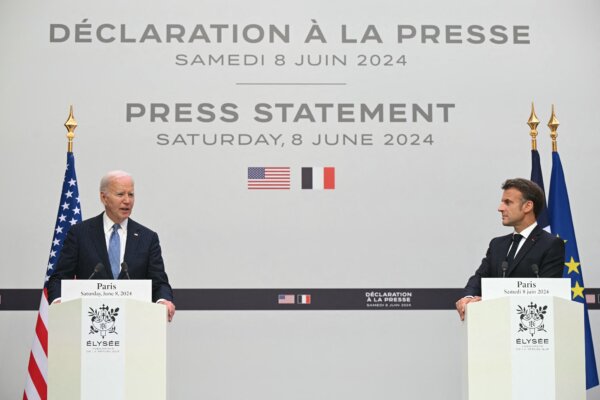
The leaders seek to tackle China’s unfair trade practices and aggression in the Indo–Pacific through a coordinated response.
PARIS, France—President Joe Biden met with French President Emmanuel Macron at the Elysee Palace in Paris on Saturday to address a wide range of pressing issues, including the wars in Ukraine and the Middle East, as well as China’s industrial overcapacity and aggression in the Indo–Pacific.
During the joint press statement, Ukraine was a key topic for both leaders. According to Mr. Macron, France and the United States share an understanding in regards to support for Ukraine. In addition, he voiced his endorsement of the Gaza peace plan put forth recently by President Biden.
The leaders opted for a “press statement” instead of a press conference; hence, they didn’t take any questions from the media. During the event, Mr. Macron expressed his desire for “a joint roadmap” regarding the wars in Ukraine and the Middle East.
Mr. Biden began his speech by praising the rescue of four Hamas hostages in a special operation by the Israeli military on Saturday. He called for the release of the remaining hostages.
While both leaders expressed a shared vision for Ukraine, releasing Russian assets currently frozen in European accounts and using them to aid Ukraine, particularly in reconstruction, is one of their main challenges.
Discussions on unlocking these assets have been ongoing between the United States and its G-7 partners. Recently, the G-7 finance ministers discussed the legality of using some 270 billion Euro of frozen Russian state assets as collateral for providing a loan to Ukraine.
Following the press statement, both leaders declined to respond when asked about their positions on frozen Russian assets.
The White House previously acknowledged that the United States cannot unilaterally decide on Russian assets “because the assets are held all over the world.”
“So, we’ve got to have participation and assistance with our allies and partners, or it won’t work,” White House National Security communications advisor John Kirby told reporters during a call on June 4.
Mr. Macron, during the press statement, highlighted China’s unfair trade practices, specifically mentioning China’s industrial overcapacity problem. He noted that the United States and France should have a coordinated response to counter this problem.
Chinese businesses are rapidly seizing market share in strategic industries such as solar panels, wind turbines, steel, and cement. The U.S. and European governments have raised concerns about China’s excessive capacity, which is largely attributed to massive government subsidies. One major concern is the impact of the overcapacity problem on international competitors and the development and innovation of industries in other countries.
During their bilateral conversation, President Biden spoke about China, highlighting the significance of coordinating and investing at home.
The president told Mr. Macron that in his recent conversation with Chinese leader Xi Jinping, Xi asked why the United States planned to potentially impose tariffs on certain vehicles. The president stated that he told the Chinese leader that Beijing is not abiding by any rules.
According to Mr. Kirby, the two presidents also seek to explore ways to deepen maritime cooperation in the Indo–Pacific.
“Specifically, we expect an announcement that we will work together to build law enforcement capacity—maritime law enforcement capacity particularly—and to increase U.S.–France technical cooperation on port security in the Indo–Pacific,” Mr. Kirby told reporters on June 7.
Before their bilateral meeting, Mr. Macron and his wife Brigitte Macron hosted a welcome ceremony for the president and First Lady Jill Biden at the Arc de Triomphe in Paris, an iconic symbol of France that honors those who fought and died in the French Revolutionary and Napoleonic Wars.
“This is a particular honor, reflecting our close and very long relationship,” Mr. Kirby said.
In December 2022, President Biden hosted President Macron at the White House for the first state visit of his administration.










